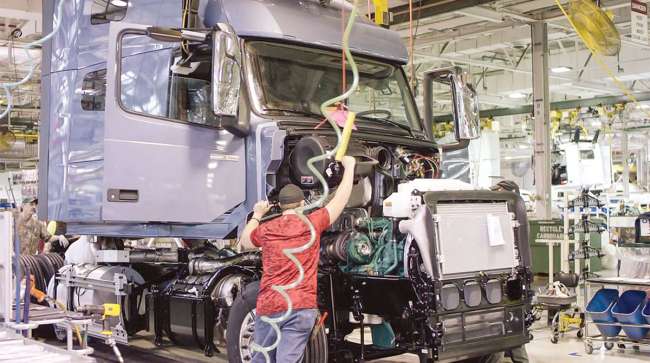Staff Reporter
Class 8 Truck Orders End Two-Month Positive Streak in March

[Stay on top of transportation news: Get TTNews in your inbox.]
North American Class 8 truck orders fell year-over-year and from the previous month during March, according to ACT Research.
ACT preliminary data showed orders declined 9.9% to 17,300 units from 19,200 during the same time in 2023, and went down 37.5% from the 27,700 units reported the previous month. The decline ended two consecutive months of year-over-year gains.
“Nascent improvements in the freight market and select OEMs’ efforts to smooth demand notwithstanding forced conservatism among a portion of the truck buying populace, capped Class 8 order activity in March,” said Steve Tam, vice president and analyst at ACT. “While we will have to wait for the details of the month’s order volumes, logic suggests waning demand for tractors in the market retrenched in March.”
ACT also noted in the report that a middling seasonal factor of 1.3% reduces intake for the month to 17,100 units. March marks the first month since May 2023 that seasonally adjusted activity fell below 20,000 units.
[April State of the Industry: Classes 5-8 Vehicles Preliminary Update] - Class 8 Truck Order Surge Paused in March
Read more from the blog - https://t.co/ILb8mdjS4y#truck #semitruck #trucking #transportation, #Class8, #ACT, #ACTResearch pic.twitter.com/EAfc1LU3Od — ACT Research (@actresearch) April 3, 2024
FTR Transportation Intelligence noted in a report that Class 8 preliminary net orders for March decreased 4.2% to 18,200 units from 19,000 during the same time last year. It also reported a sequential decline of 34% from February. The report found that orders for the past 12 months have totaled 264,800 units.
“Despite weakness in the freight markets that has persisted for more than a year, fleets continue to be willing to order new equipment,” FTR Chairman Eric Starks said. “Order levels in March were below the historical average but remained in line with seasonal trends.”
Want more news? Listen to today's daily briefing above or go here for more info
FTR noted in the report that March orders are consistent with the recent demand trend and are in line with seasonal expectations. This is similar to what it concluded about activity in February. The report added orders appear to be slowing at a seasonally typical rate after maintaining an average level of around 27,000 units for the past three months.
“Demand is not declining rapidly, but neither is the market doing significantly better than replacement level demand,” Starks said. “Our expectation for replacement output by the end of this year is unchanged.”
FTR is optimistic the market still is performing at a solid level with activity comparable to the year-ago period. Its report also noted that build slots continue to be filled at a healthy rate.



